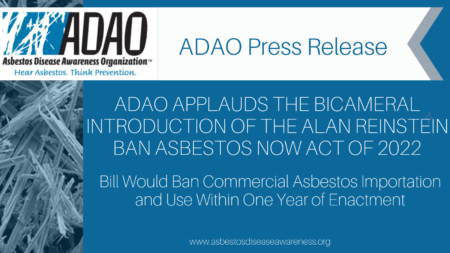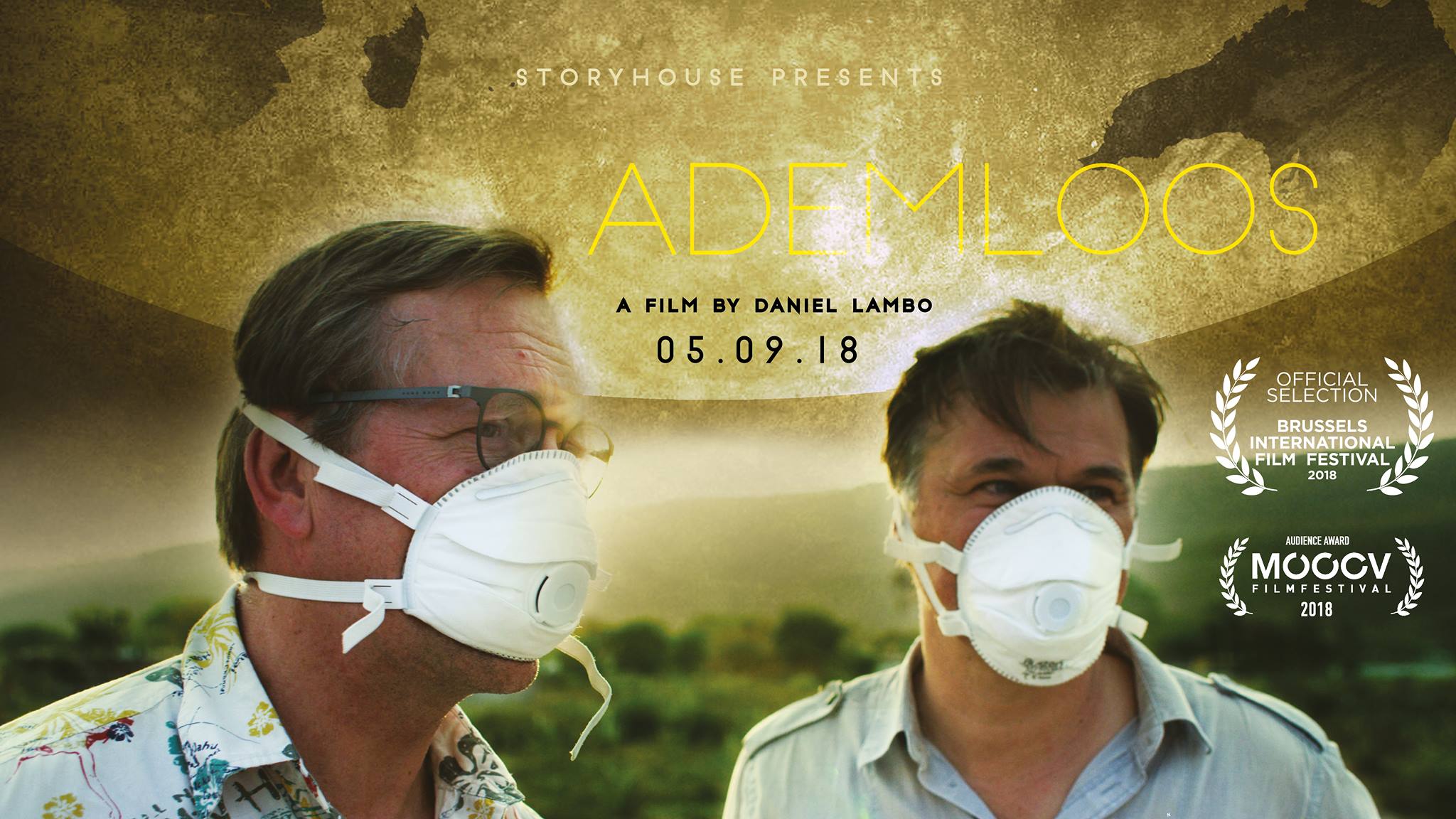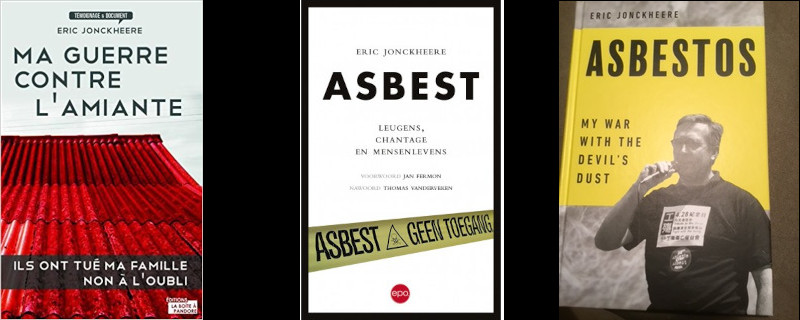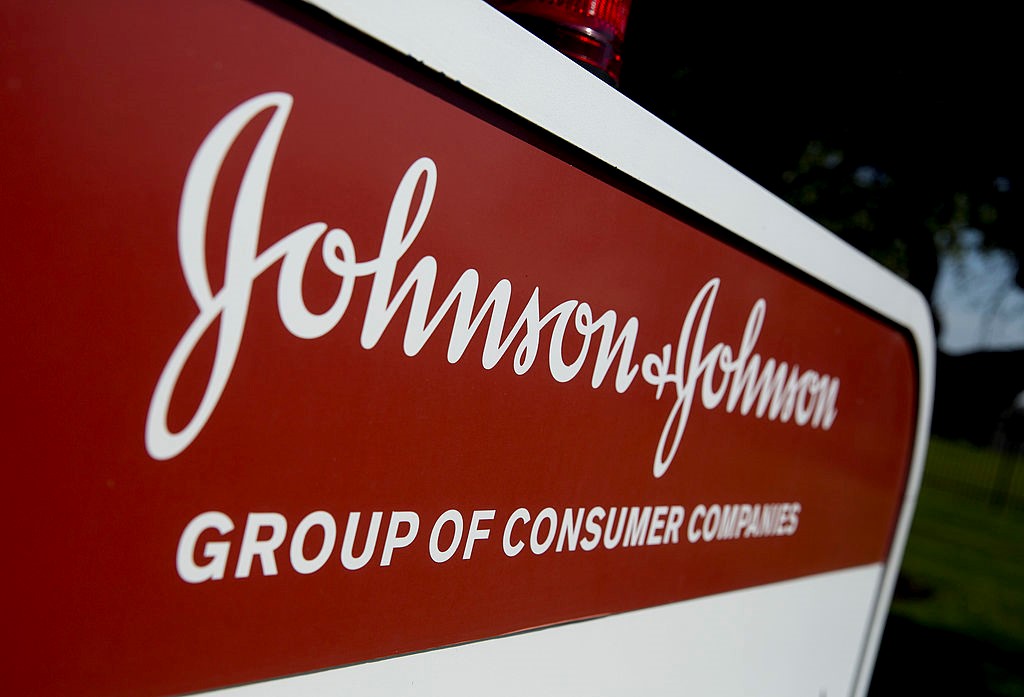ADAO APPLAUDS THE BICAMERAL INTRODUCTION OF THE ALAN REINSTEIN BAN ASBESTOS NOW ACT OF 2022

Joint Press Release: MERKLEY, BONAMICI INTRODUCE BICAMERAL LEGISLATION TO BAN ASBESTOS AND SAVE LIVES https://bit.ly/3wEB46m
‘‘Alan Reinstein Ban 5 Asbestos Now Act of 2022’’ text
Posted on May 18, 2022
THE ASBESTOS DISEASE AWARENESS ORGANIZATION APPLAUDS THE BICAMERAL INTRODUCTION OF THE ALAN REINSTEIN BAN ASBESTOS NOW ACT OF 2022
Bill Would Ban Commercial Asbestos Importation and Use Within One Year of Enactment
WASHINGTON, DC – The Asbestos Disease Awareness Organization (ADAO), an independent nonprofit dedicated to preventing asbestos exposure, today applauds Senator Jeff Merkley (D-OR) and Representative Suzanne Bonamici (D-OR) for introducing the Alan Reinstein Ban Asbestos Now (ARBAN) Act of 2022.
Lees meer: ADAO Press Release :

U bent van harte uitgenodigd in het Ciné Palace (Brussel) op 18 mei om 20 uur.
EP-lid Sara Matthieu presenteert de vertoning van "Breathless, Ademloos", een documentaire die een koelbloedige asbestindustrie blootlegt die nog steeds het leven van werknemers en consumenten over de hele wereld in gevaar brengt.
Na de dood van zijn vader en vele anderen in zijn dorp, Kapelle-op-den-Bos, begint filmmaker Daniel Lambo aan een gepassioneerde zoektocht naar de waarheid over de dodelijke asbestindustrie. Zijn zoektocht brengt hem naar de grootste stortplaats voor asbestafval in India. Een aangrijpend verhaal over de strijd van individuen tegen een bloeiende asbestindustrie.
Voorafgaand aan de documentaire zal Europarlementariër Nikolaj Villumsen uiteenzetten hoe het Europees Parlement de burgers en werknemers in de EU wil beschermen tegen asbest.
Na de discussie wordt een drankje aangeboden. Sprekers zijn Europarlementslid Sara Matthieu (Groenen/EVA), Europarlementslid Nikolaj Villumsen (Links) en Eric Jonckheere (ABEVA - Belgische vereniging van asbestslachtoffers).
Vrije toegang - Reserveer uw plaats op 02/503.57.96 of Dit e-mailadres wordt beveiligd tegen spambots. JavaScript dient ingeschakeld te zijn om het te bekijken.
28 april is de Werelddag voor veiligheid en gezondheid op het werk. Elk jaar doodt asbest wereldwijd meer dan 220.000 werknemers aan kanker. Het is de belangrijkste oorzaak van beroepskanker in de Europese Unie.
Asbest veroorzaakt ook tienduizenden extra slachtoffers in de gezinnen van blootgestelde werknemers en in de omgeving van mijnen en fabrieken.
ABEVA, de Belgische Vereniging van Asbestslachtoffers, verdedigt hun zaak.
Zij nodigt u uit op een persconferentie op donderdag 28 april, om u in te lichten over een nieuwe juridische actie die haar voorzitter Eric JONCKHEERE heeft ondernomen.
Na de dood van vier leden van zijn familie door asbest, is Eric op zijn beurt getroffen. In het verlengde van de succesvolle rechtszaak die zijn moeder Françoise Van Noorbeeck heeft aangespannen tegen de firma Eternit, heeft hij besloten een nieuwe rechtszaak aan te spannen tegen diezelfde firma.

Welkom in Kapelle-op-den-Bos, op 35 km ten noorden van Brussel, waar de Eternit
fabrieken asbestcement produceerden en 2600 mensen tewerkstelden. Helaas, dit alles heeft een zware menselijke tol geëist; duizenden, zelfs miljoenen doden in de streek en in de wereld en dat terwijl de historische aandeelhouders (familie Emsens) de gevaren van asbest kenden sinds de jaren 60! De goede gezondheid van hun portefeuille woog zwaarder dan de gezondheid van hun werknemers. De werknemers bij Eternit die ziek worden ten gevolge van asbest, verliezen gemiddeld 20 levensjaren in vergelijking met de algemene bevolking. De kaarten die in deze film worden afgebeeld, tonen aan dat de familie Jonckheere niet de enige was die overleed aan de gevolgen van de asbestproductie bij Eternit. Helaas, ze is (bijna) de enige die durft spreken, aan de kaak stellen, schreeuwen.
Nederlandse versie : https://youtu.be/tlGJKyJFhQ0
Franse versie : https://youtu.be/viY4JdI7MzM
Engelse versie : https://youtu.be/VbpmM30bqpQ

Het boek van Eric is eindelijk in het Nederlands beschikbaar. Ook in het Engels.
Het wordt doorgestuurd tegen de prijs van 20€ op onze rekening BE17 0001 2069 9221, met vermelding van de gewenste taal en uw adres.
This content was published on April 6, 2022 - 19:36
swissinfo.ch/urs

Several courts in Italy have dealt with cases against Schmidheiny over the past 20 years. The archive photo from 2015 shows relatives of victims with Italian flags calling for justice in the asbestos case. Keystone/Alessandro Di Marco
A court in Italy has sentenced Swiss businessman Stephan Schmidheiny to 42 months in prison over the death of a former worker at an asbestos company.
The jury found Schmidheiny, a former majority shareholder in the company, guilty of involuntary manslaughter, according to the Italian ANSA news agency.
The factory worker had been exposed to asbestos, the jury found.
However, Schmidheiny was acquitted in seven other cases involving a company near Naples on Wednesday.
Schmidheiny’s lawyers told the Swiss Keystone-SDA news agency that they would appeal against the verdict, saying the ruling went against Italian law and basic legal principles.
Series of cases
The verdict is the latest in series of court cases in Italy against 74-year-old Schmidheiny who has denied any responsibility.
So far, he has always been cleared by higher courts.
In a high-profile case in 2014, Italy’s Supreme Court acquitted Schmidheiny of any responsibility for the deaths of almost 3,000 people. The judges ruled that the statute of limitations had passed in 1998.
The verdict had prompted an outcry from trade unions, environmental organisations and relatives of the victims.
Research of Johnson & Johnson’s baby powder included a prison study in which inmates, mostly Black men, were injected with asbestos. The study was intended to assess how asbestos’s effects on the skin compare to talc, the key component of baby powder.
By FRANK VINLUAN
Mar 7, 2022 at 6:19 PM

Johnson & Johnson’s research into the safety of its baby powder included a study in which inmates, mostly Black men, were injected with asbestos to compare the cancer-causing compound to talc, according to unsealed court documents reviewed by Bloomberg.
While the human experiments involving prisoners at Holmesburg Prison outside of Philadelphia was previously revealed in books and newspaper articles, J&J’s involvement in the studies comparing talc to asbestos was not made public until the Bloomberg report on Monday. The court documents were unsealed in two trials last year over claims that J&J’s baby powder causes cancer. J&J expressed regret over the company’s involvement with Albert Kligman, the University of Pennsylvania dermatologist who conducted the baby powder tests. But Bloomberg said that the company also noted that the tests did not violate research standards at the time.
“We deeply regret the conditions under which these studies were conducted, and in no way do they reflect the values or practices we employ today,” Kim Montagnino, a company spokeswoman, said in an emailed statement to Bloomberg. “As the world’s largest healthcare company, our transparent, diligent approach to bioethics is at the heart of all we promise our customers and society.”
Asbestos is often found in locations where talc is mined. Scientists determined that asbestos was linked to cancer in the 1950s. J&J did not dispute that it had hired Kligman in the 1960s to conduct baby powder tests. The unsealed court documents state that the asbestos test in 1971 involved recruiting 10 prisoners who received injections of two types of asbestos, tremolite and chrysotile, along with a talc shot in their lower backs.
The revelation of J&J’s involvement in the Holmesburg tests comes as the company continues to fight litigation alleging that the talc-based baby powder contained asbestos. The pharmaceutical giant has consistently said that its baby powder never had asbestos. Nevertheless, J&J has lost some of the lawsuits alleging harm from the product, which the company stopped marketing in the U.S. and Canada in 2020.
J&J currently faces about 40,000 lawsuits related to its talc-based powder. Last year, the company used a Texas law to consolidate the talc litigation into a separate cosmetics subsidiary. Last October, this unit filed for bankruptcy, a move that limits the amounts litigants can recover in damages from the alleged harm they incurred from the baby powder. A federal judge ruled last month that J&J may proceed with this bankruptcy strategy.
J&J is also in the midst of reorganizing its business, splitting off its drugs and medical device operations from its consumer health business, which will take on a new name. When this move was announced last November, Morningstar analyst Damien Conover said in a research note that the separation would remove the deep pockets of the combined company, which in turn would reduce the financial risks of consumer products litigation such as the baby powder lawsuits.
The revelation of J&J’s involvement with Kligman could have a bearing on litigants who opt out of the bankruptcy case, Carl Tobias, a University of Richmond law professor who follows the litigation, told Bloomberg. Though jurors have heard about the results of Kligman’s asbestos study, they were not told that the test was done on inmates or that most of the tests were done on Black men. But that could change in future litigation, and could be used by plaintiffs in punitive damages presentations, Tobias said.
Kligman died in 2010 without ever acknowledging any wrongdoing. In 1998, he told the Baltimore Sun that his use of paid prisoners as research subjects in the 1950s and 1960s was consistent with standard U.S. protocols for scientific research at the time.
*********************************************
Court docs reveal J&J’s role in prison tests comparing talc to asbestos.
https://medcitynews.com/2022/03/bloomberg-court-docs-reveal-jjs-role-in-prison-tests-comparing-talc-to-asbestos/